北师大版(2019)选择性必修 第三册Unit 8 Literature Lesson 1 The Last Leaf 状态动词和动作动词课件(共18张PPT)
文档属性
| 名称 | 北师大版(2019)选择性必修 第三册Unit 8 Literature Lesson 1 The Last Leaf 状态动词和动作动词课件(共18张PPT) |
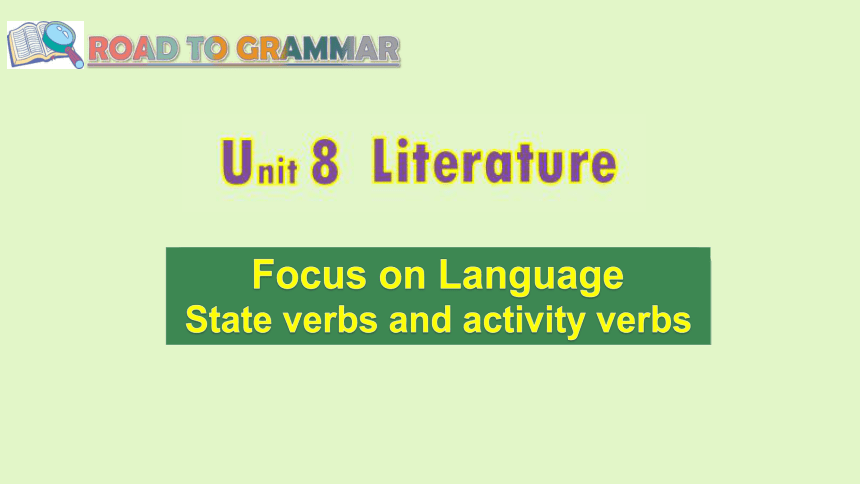
|
|
| 格式 | pptx | ||
| 文件大小 | 580.8KB | ||
| 资源类型 | 教案 | ||
| 版本资源 | 北师大版(2019) | ||
| 科目 | 英语 | ||
| 更新时间 | 2024-03-28 20:08:49 | ||
图片预览

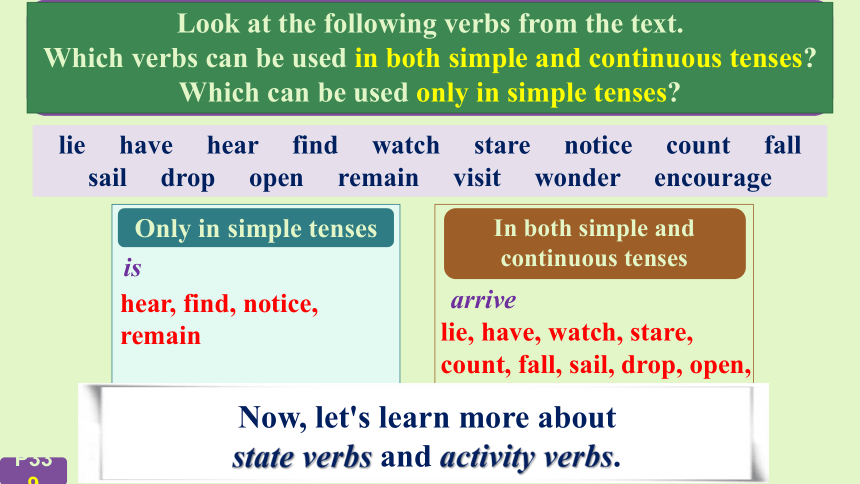
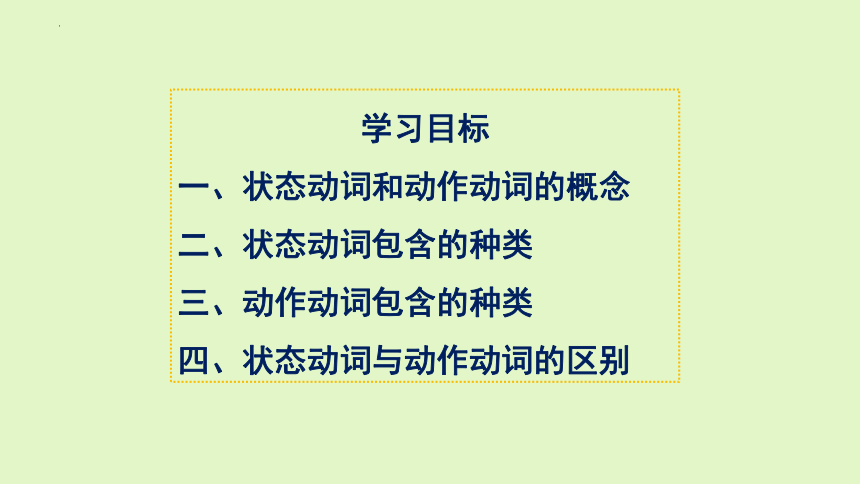
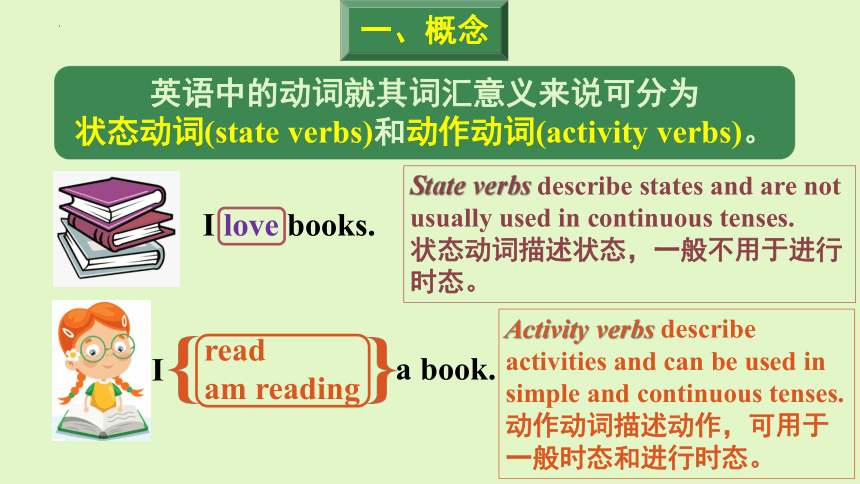
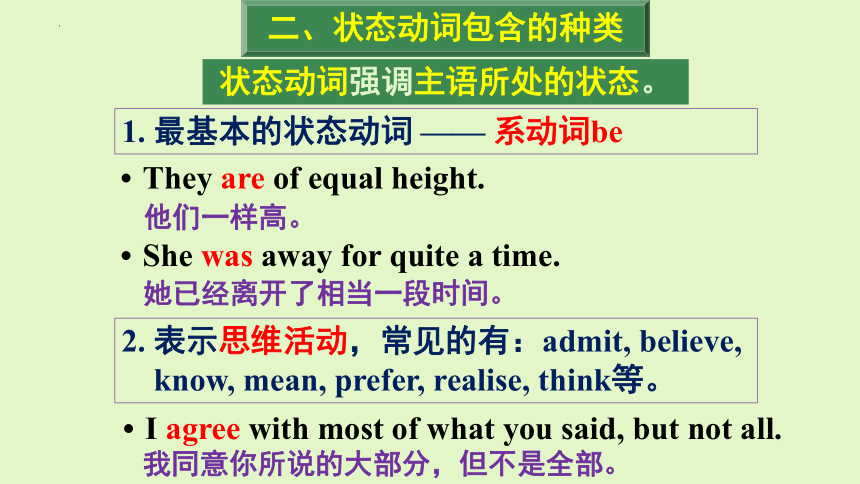
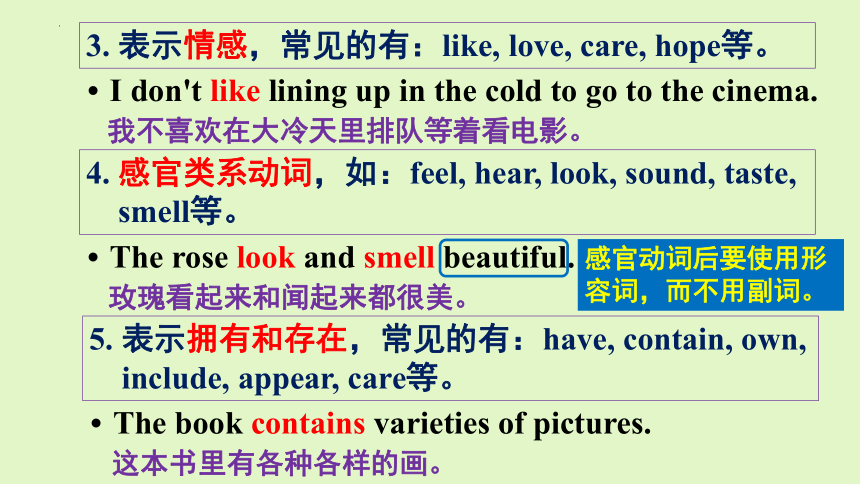
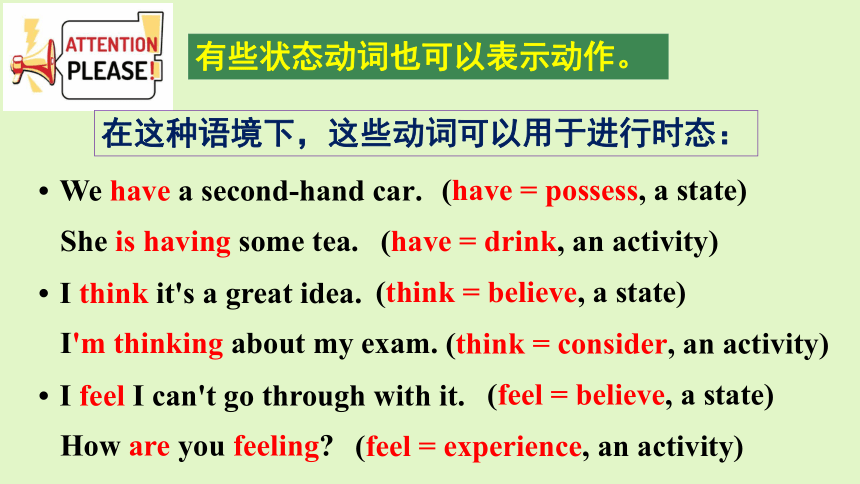
文档简介
(共18张PPT)
Focus on Language
State verbs and activity verbs
Look at the following verbs from the text.
Which verbs can be used in both simple and continuous tenses Which can be used only in simple tenses
P33 9
lie have hear find watch stare notice count fall
sail drop open remain visit wonder encourage
Only in simple tenses
is
In both simple and continuous tenses
arrive
hear, find, notice, remain
lie, have, watch, stare, count, fall, sail, drop, open, visit, wonder, encourage
state verbs 状态动词
activity verbs 动作动词
Now, let's learn more about
state verbs and activity verbs.
学习目标
一、状态动词和动作动词的概念
二、状态动词包含的种类
三、动作动词包含的种类
四、状态动词与动作动词的区别
英语中的动词就其词汇意义来说可分为
状态动词(state verbs)和动作动词(activity verbs)。
I love books.
State verbs describe states and are not usually used in continuous tenses.
状态动词描述状态,一般不用于进行时态。
read
am reading
I
a book.
Activity verbs describe activities and can be used in simple and continuous tenses.
动作动词描述动作,可用于一般时态和进行时态。
一、概念
二、状态动词包含的种类
· They are of equal height.
· She was away for quite a time.
他们一样高。
她已经离开了相当一段时间。
1. 最基本的状态动词 —— 系动词be
状态动词强调主语所处的状态。
· I agree with most of what you said, but not all.
我同意你所说的大部分,但不是全部。
2. 表示思维活动,常见的有:admit, believe,
know, mean, prefer, realise, think等。
· I don't like lining up in the cold to go to the cinema.
我不喜欢在大冷天里排队等着看电影。
3. 表示情感,常见的有:like, love, care, hope等。
· The rose look and smell beautiful.
玫瑰看起来和闻起来都很美。
4. 感官类系动词,如:feel, hear, look, sound, taste,
smell等。
· The book contains varieties of pictures.
这本书里有各种各样的画。
5. 表示拥有和存在,常见的有:have, contain, own,
include, appear, care等。
感官动词后要使用形容词,而不用副词。
有些状态动词也可以表示动作。
在这种语境下,这些动词可以用于进行时态:
· We have a second-hand car.
She is having some tea.
· I think it's a great idea.
I'm thinking about my exam.
· I feel I can't go through with it.
How are you feeling
(have = possess, a state)
(have = drink, an activity)
(think = believe, a state)
(think = consider, an activity)
(feel = believe, a state)
(feel = experience, an activity)
三、动作动词包含的种类
动作动词强调主语在做的动作。
· Mary is reading an English novel.
· I read much less now than I used to.
· Sorry, I wasn't really listening.
· I listen to the radio on the way to work.
玛丽正在读一本英文小说。
我现在看的书比过去少得多。
对不起,我没注意听。
我在上班的路上听广播。
1. 表示持续性动作的动词,常见的有:
eat, listen, read, run等。
· The water is warm in the pool, so Mary jumps in.
池里的水很暖和,所以玛丽就跳了下去。
2. 表示短暂性动作的动词,常见的有:hit, jump等。
这类动词如果用在现在时中,可表示现时的一次
性动作。
表示短暂性动作的动词通常不用于进行时态中,如果用于进行时的话,那就表示短暂性动作的多次重复。
The children were jumping up and down with excitement.
孩子们兴奋地跳上跳下。
· I go home at 7:00 pm.
· I am going home at 7:00 pm tomorrow.
我下午七点回家。
3. 表示转变和移动的动词,常见的有:arrive,
change, come, go, leave等。
我将在明天下午七点回家。
这类动词用于一般现在时表示现时的习惯性动作,用于进行时表示即将发生的事态。
四、状态动词与动作动词的区别
· Close the window!
· Have a pen.
1. 动作动词可用于祈使句,而状态动词则不能。
· She is playing volleyball.
· That dictionary is belonging to Tom.
2. 动作动词可用于进行时,而状态动词则不能。
· My mother asked me to put the book back.
· My mother asked me to own the book.
3. 动作动词可用于作宾补,而状态动词则不能。
状态动词表示某一具体行为时,用be doing.
Which sentences cannot be changed into the present continuous tense
P33 10
a The coffee tastes awful.
b We have breakfast very early.
c They feel they need more time.
d I have a serious headache.
e She thinks about her mother a lot.
Which of the following sentences are wrong
Correct the wrong ones.
1. I'm loving the painting you bought yesterday.
2. Dad is lying on the bed now.
3. We are noticing the changes in the experiment.
4. He's having a bath.
5. Why is he staring at me
6. Where did he drop his suitcase
P33 11
I love the painting you bought yesterday.
We noticed the changes in the experiment.
表示持续性动作
表示短暂性动作
表示转变和移动
系动词be
表示思维活动
表示情感
感官类系动词
表示拥有和存在
动作动词
状态动词
英语动词
区别:
1. 动作动词可用于祈使句,
而状态动词则不能。
2. 动作动词可用于进行时,
而状态动词则不能。
3. 动作动词可用于作宾补,
而状态动词则不能。
There are ten incorrect verb forms in this newspaper report.
Correct the mistakes.
Help for hikers and villagers in the Himalayas
Hikers and villagers in the Himalayas get help from a group of British teenagers, who are working with the British and Nepalese Red Cross. The teenagers go from village to village in the dangerous mountain areas. They give out first aid boxes. “We have a great time,” is saying Mandy Richards from Surrey. “We are having First Aid lessons at school back home, so we are knowing how to help when we are coming here. The villagers here are always making their own medicine and sometimes that works and sometimes it isn't working. We feel that we are helping them and the villagers are feeling the same.” Mandy, who is wanting to be a doctor when she leaves school, is 16 years old.
P84 4
Check your answers.
Help for hikers and villagers in the Himalayas
Hikers and villagers in the Himalayas get help from a group of British
teenagers, who are working with the British and Nepalese Red Cross.
The teenagers go from village to village in the dangerous mountain
areas. They give out first aid boxes. “We have a great time,” is saying
Mandy Richards from Surrey. “We are having First Aid lessons at
school back home, so we are knowing how to help when we are coming here.
are getting help
have been going
are having
says
had
know
are
The villagers here are always making their own medicine and
sometimes that works and sometimes it isn't working. We feel
that we are helping them and the villagers are feeling the same.”
Mandy, who is wanting to be a doctor when she leaves school, is
16 years old.
always make
doesn't work
feel
wants
Focus on Language
State verbs and activity verbs
Look at the following verbs from the text.
Which verbs can be used in both simple and continuous tenses Which can be used only in simple tenses
P33 9
lie have hear find watch stare notice count fall
sail drop open remain visit wonder encourage
Only in simple tenses
is
In both simple and continuous tenses
arrive
hear, find, notice, remain
lie, have, watch, stare, count, fall, sail, drop, open, visit, wonder, encourage
state verbs 状态动词
activity verbs 动作动词
Now, let's learn more about
state verbs and activity verbs.
学习目标
一、状态动词和动作动词的概念
二、状态动词包含的种类
三、动作动词包含的种类
四、状态动词与动作动词的区别
英语中的动词就其词汇意义来说可分为
状态动词(state verbs)和动作动词(activity verbs)。
I love books.
State verbs describe states and are not usually used in continuous tenses.
状态动词描述状态,一般不用于进行时态。
read
am reading
I
a book.
Activity verbs describe activities and can be used in simple and continuous tenses.
动作动词描述动作,可用于一般时态和进行时态。
一、概念
二、状态动词包含的种类
· They are of equal height.
· She was away for quite a time.
他们一样高。
她已经离开了相当一段时间。
1. 最基本的状态动词 —— 系动词be
状态动词强调主语所处的状态。
· I agree with most of what you said, but not all.
我同意你所说的大部分,但不是全部。
2. 表示思维活动,常见的有:admit, believe,
know, mean, prefer, realise, think等。
· I don't like lining up in the cold to go to the cinema.
我不喜欢在大冷天里排队等着看电影。
3. 表示情感,常见的有:like, love, care, hope等。
· The rose look and smell beautiful.
玫瑰看起来和闻起来都很美。
4. 感官类系动词,如:feel, hear, look, sound, taste,
smell等。
· The book contains varieties of pictures.
这本书里有各种各样的画。
5. 表示拥有和存在,常见的有:have, contain, own,
include, appear, care等。
感官动词后要使用形容词,而不用副词。
有些状态动词也可以表示动作。
在这种语境下,这些动词可以用于进行时态:
· We have a second-hand car.
She is having some tea.
· I think it's a great idea.
I'm thinking about my exam.
· I feel I can't go through with it.
How are you feeling
(have = possess, a state)
(have = drink, an activity)
(think = believe, a state)
(think = consider, an activity)
(feel = believe, a state)
(feel = experience, an activity)
三、动作动词包含的种类
动作动词强调主语在做的动作。
· Mary is reading an English novel.
· I read much less now than I used to.
· Sorry, I wasn't really listening.
· I listen to the radio on the way to work.
玛丽正在读一本英文小说。
我现在看的书比过去少得多。
对不起,我没注意听。
我在上班的路上听广播。
1. 表示持续性动作的动词,常见的有:
eat, listen, read, run等。
· The water is warm in the pool, so Mary jumps in.
池里的水很暖和,所以玛丽就跳了下去。
2. 表示短暂性动作的动词,常见的有:hit, jump等。
这类动词如果用在现在时中,可表示现时的一次
性动作。
表示短暂性动作的动词通常不用于进行时态中,如果用于进行时的话,那就表示短暂性动作的多次重复。
The children were jumping up and down with excitement.
孩子们兴奋地跳上跳下。
· I go home at 7:00 pm.
· I am going home at 7:00 pm tomorrow.
我下午七点回家。
3. 表示转变和移动的动词,常见的有:arrive,
change, come, go, leave等。
我将在明天下午七点回家。
这类动词用于一般现在时表示现时的习惯性动作,用于进行时表示即将发生的事态。
四、状态动词与动作动词的区别
· Close the window!
· Have a pen.
1. 动作动词可用于祈使句,而状态动词则不能。
· She is playing volleyball.
· That dictionary is belonging to Tom.
2. 动作动词可用于进行时,而状态动词则不能。
· My mother asked me to put the book back.
· My mother asked me to own the book.
3. 动作动词可用于作宾补,而状态动词则不能。
状态动词表示某一具体行为时,用be doing.
Which sentences cannot be changed into the present continuous tense
P33 10
a The coffee tastes awful.
b We have breakfast very early.
c They feel they need more time.
d I have a serious headache.
e She thinks about her mother a lot.
Which of the following sentences are wrong
Correct the wrong ones.
1. I'm loving the painting you bought yesterday.
2. Dad is lying on the bed now.
3. We are noticing the changes in the experiment.
4. He's having a bath.
5. Why is he staring at me
6. Where did he drop his suitcase
P33 11
I love the painting you bought yesterday.
We noticed the changes in the experiment.
表示持续性动作
表示短暂性动作
表示转变和移动
系动词be
表示思维活动
表示情感
感官类系动词
表示拥有和存在
动作动词
状态动词
英语动词
区别:
1. 动作动词可用于祈使句,
而状态动词则不能。
2. 动作动词可用于进行时,
而状态动词则不能。
3. 动作动词可用于作宾补,
而状态动词则不能。
There are ten incorrect verb forms in this newspaper report.
Correct the mistakes.
Help for hikers and villagers in the Himalayas
Hikers and villagers in the Himalayas get help from a group of British teenagers, who are working with the British and Nepalese Red Cross. The teenagers go from village to village in the dangerous mountain areas. They give out first aid boxes. “We have a great time,” is saying Mandy Richards from Surrey. “We are having First Aid lessons at school back home, so we are knowing how to help when we are coming here. The villagers here are always making their own medicine and sometimes that works and sometimes it isn't working. We feel that we are helping them and the villagers are feeling the same.” Mandy, who is wanting to be a doctor when she leaves school, is 16 years old.
P84 4
Check your answers.
Help for hikers and villagers in the Himalayas
Hikers and villagers in the Himalayas get help from a group of British
teenagers, who are working with the British and Nepalese Red Cross.
The teenagers go from village to village in the dangerous mountain
areas. They give out first aid boxes. “We have a great time,” is saying
Mandy Richards from Surrey. “We are having First Aid lessons at
school back home, so we are knowing how to help when we are coming here.
are getting help
have been going
are having
says
had
know
are
The villagers here are always making their own medicine and
sometimes that works and sometimes it isn't working. We feel
that we are helping them and the villagers are feeling the same.”
Mandy, who is wanting to be a doctor when she leaves school, is
16 years old.
always make
doesn't work
feel
wants
